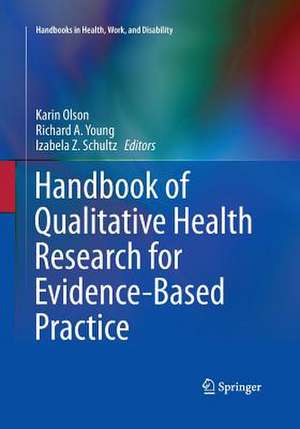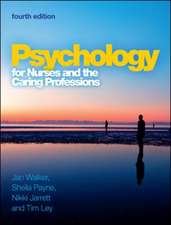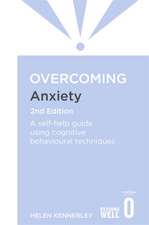Handbook of Qualitative Health Research for Evidence-Based Practice: Handbooks in Health, Work, and Disability, cartea 4
Editat de Karin Olson, Richard A. Young, Izabela Z. Schultzen Limba Engleză Paperback – 23 aug 2016
Among the topics in the Handbook:
·Examining qualitative alternatives to categorical representation.
·The World Health Organization model of health: what evidence is needed?
·Qualitative research in mental health and mental illness.
·Qualitative evidence in pediatrics.
·The contribution of qualitative research to medication adherence.
·Qualitative evidence in health policy analysis.
The Handbook of Qualitative Health Research for Evidence-Based Practice offers health and clinical psychologists, rehabilitation specialists,occupational and physical therapists, nurses, family physicians and other primary care providers new ways for understanding patients' health-related experiences and opens up new ways for developing interventions intended to improve health outcomes.
| Toate formatele și edițiile | Preț | Express |
|---|---|---|
| Paperback (1) | 1622.93 lei 6-8 săpt. | |
| Springer – 23 aug 2016 | 1622.93 lei 6-8 săpt. | |
| Hardback (1) | 2136.60 lei 6-8 săpt. | |
| Springer – 13 oct 2015 | 2136.60 lei 6-8 săpt. |
Preț: 1622.93 lei
Preț vechi: 1708.35 lei
-5% Nou
Puncte Express: 2434
Preț estimativ în valută:
310.58€ • 337.25$ • 260.89£
310.58€ • 337.25$ • 260.89£
Carte tipărită la comandă
Livrare economică 23 aprilie-07 mai
Preluare comenzi: 021 569.72.76
Specificații
ISBN-13: 9781493945979
ISBN-10: 1493945971
Pagini: 567
Ilustrații: XX, 567 p. 15 illus., 7 illus. in color.
Dimensiuni: 178 x 254 mm
Greutate: 1.01 kg
Ediția:Softcover reprint of the original 1st ed. 2016
Editura: Springer
Colecția Springer
Seria Handbooks in Health, Work, and Disability
Locul publicării:New York, NY, United States
ISBN-10: 1493945971
Pagini: 567
Ilustrații: XX, 567 p. 15 illus., 7 illus. in color.
Dimensiuni: 178 x 254 mm
Greutate: 1.01 kg
Ediția:Softcover reprint of the original 1st ed. 2016
Editura: Springer
Colecția Springer
Seria Handbooks in Health, Work, and Disability
Locul publicării:New York, NY, United States
Cuprins
Part 1 Setting the Stage.- Using Qualitative Health Research to Transform the Nature of Evidence.- Social Context of Health and Diversity Issues.- Examining Qualitative Alternatives to Categorical Representation:The Case of Culture and Health.- Contextual Action Theory: An Integrative Framework for Qualitative Health Research.- The World Health Organization Model of Health: What Evidence is Needed?.- Qualitative and Quantitative Evidence in Health – The Critics View.- Part 2: Reviews of Qualitative Health Research.- Evaluating Qualitative Health Research from Inside and Outside.- The Contributions of Qualitative Research to Cardiac Conditions.- Qualitative Evidence in Pain.- Qualitative Evidence on Psychological Trauma.- Qualitative Evidence and the Development of Sexuality Education Materials: The Case of Family Planning New Zealand.- Qualitative Evidence in Addictions.- Qualitative Research in Mental Health and Mental Illness.- Qualitative Evidence in Occupational Health.- Qualitative Evidence in Health Promotion.- Qualitative Evidence in Pediatrics.- Qualitative Evidence in Working with Cognitively Impaired Older Adults.- Qualitative Evidence in Chronic Obstructive Pulmonary Disease.- Qualitative Evidence in the Study of HIV/AIDS and Sensitive Topics: The contribution of online qualitative research.- Qualitative Evidence in Suicide Ideation, Attempts, and Suicide Prevention.- Qualitative Evidence in Suicide: Findings from Qualitative Psychological Autopsy Studies.- Qualitative Evidence in Treatment Adherence.- Disability as a Dimension of Diversity.- Qualitative Evidence in Chronic, Disabling Conditions (Childhood or Early Onset Physical Impairment).- Part 3: Using Qualitative Health Research to Improve Health.- What use is it anyway? Considering Modes of Application and Contributions of Qualitative InquiryBeyond Dissemination: Generating and Applying Qualitative Evidence Through Community-Based Participatory Research.- Using Qualitative Evidence to Develop an Intervention for Enabling People with Chronic Disabling Conditions to be More Physically Active.-The Contribution of Qualitative Research to Medication Adherence.- At Diagnosis and at Death: Using Qualitative Evidence to Inform Psychosocial Interventions in OncologyChange Process Research.- Qualitative Evidence in Health Policy Analysis.- Generating New Health Knowledge.
Notă biografică
Karin Olson completed a B. Sc. in Nursing at the University of Alberta (1976), a Masters in Health Science with a focus in Health Promotion at the University of Toronto (1981), and a PhD in Educational Psychology at the University of Alberta (1990). She is a Professor in the Faculty of Nursing at the University of Alberta where she is also a Distinguished Scholar at the International Institute for Qualitative Methodology. Dr. Olson also holds an adjunct appointment to the Division of Palliative Medicine, Faculty of Medicine and Dentistry, University of Alberta. Her research focuses on use of qualitative and quantitative methods to develop an etiological model of fatigue in advanced cancer.
Richard Young is Professor of Counselling Psychology at the University of British Columbia. He is a Fellow of both the Canadian Psychological Association and the American Psychological Association and a Registered Psychologist in British Columbia, Canada. His current research interests include the application of action theory and the qualitative action-project method to a variety of research topics, including the transition to adulthood, families, career development, counselling, health, and suicide. He is the author of over 75 articles published in scholarly journals, and a number of other publications, including five co-edited or co-authored books. His most recent co-authored book is Transition to adulthood: Actions, projects, and counseling (Springer-Science, 2011). He is the past-president of Division 16 (Counselling Psychology) of the International Association of Applied Psychology.
Dr. Izabela Z. Schultz is Professor of Rehabilitation Psychology and Director of Graduate Program in Vocational Rehabilitation Counselling in the Department of Educational and Counselling and Special Education at the University of British Columbia. Dr. Schultz is doubly board certified as diplomate in clinical psychology, American Board of Professional Psychology and as diplomate of the American Board of Vocational Experts. She has received international awards for her innovative research on prediction of occupational disability and professional leadership awards for major contributions to medico-legal aspects of rehabilitation psychology. She has published several books and numerous seminal papers and book chapters in the field of occupational disability and rehabilitation. She is an editor of the Work and Disability Section of Springer’s Psychological Injury and the Law and a founding member of this international journal. Recently, she completed, with Dr. Sally Rogers, the pioneering Work Accommodation and Retention in Mental Health (Springer). Dr. Schultz is also a co-chair of the American Psychological Association’s Task Force on Assessment and Treatment of Persons with Disabilities. She has been leading development of best-evidence-informed practice guidelines in early musculoskeletal pain interventions, in work accommodation and retention in mental health, and in assessment and treatment of persons with disabilities.Psychological Injury and the Law and a founding member of this international journal. Recently, she completed, with Dr. Sally Rogers, the pioneering Work Accommodation and Retention in Mental Health (Springer). Dr. Schultz is also a co-chair of the American Psychological Association’s Task Force on Assessment and Treatment of Persons with Disabilities. She has been leading development of best-evidence-informed practice guidelines in early musculoskeletal pain interventions, in work accommodation and retention in mental health, and in assessment and treatment of persons with disabilities.
Richard Young is Professor of Counselling Psychology at the University of British Columbia. He is a Fellow of both the Canadian Psychological Association and the American Psychological Association and a Registered Psychologist in British Columbia, Canada. His current research interests include the application of action theory and the qualitative action-project method to a variety of research topics, including the transition to adulthood, families, career development, counselling, health, and suicide. He is the author of over 75 articles published in scholarly journals, and a number of other publications, including five co-edited or co-authored books. His most recent co-authored book is Transition to adulthood: Actions, projects, and counseling (Springer-Science, 2011). He is the past-president of Division 16 (Counselling Psychology) of the International Association of Applied Psychology.
Dr. Izabela Z. Schultz is Professor of Rehabilitation Psychology and Director of Graduate Program in Vocational Rehabilitation Counselling in the Department of Educational and Counselling and Special Education at the University of British Columbia. Dr. Schultz is doubly board certified as diplomate in clinical psychology, American Board of Professional Psychology and as diplomate of the American Board of Vocational Experts. She has received international awards for her innovative research on prediction of occupational disability and professional leadership awards for major contributions to medico-legal aspects of rehabilitation psychology. She has published several books and numerous seminal papers and book chapters in the field of occupational disability and rehabilitation. She is an editor of the Work and Disability Section of Springer’s Psychological Injury and the Law and a founding member of this international journal. Recently, she completed, with Dr. Sally Rogers, the pioneering Work Accommodation and Retention in Mental Health (Springer). Dr. Schultz is also a co-chair of the American Psychological Association’s Task Force on Assessment and Treatment of Persons with Disabilities. She has been leading development of best-evidence-informed practice guidelines in early musculoskeletal pain interventions, in work accommodation and retention in mental health, and in assessment and treatment of persons with disabilities.Psychological Injury and the Law and a founding member of this international journal. Recently, she completed, with Dr. Sally Rogers, the pioneering Work Accommodation and Retention in Mental Health (Springer). Dr. Schultz is also a co-chair of the American Psychological Association’s Task Force on Assessment and Treatment of Persons with Disabilities. She has been leading development of best-evidence-informed practice guidelines in early musculoskeletal pain interventions, in work accommodation and retention in mental health, and in assessment and treatment of persons with disabilities.
Textul de pe ultima copertă
This progressive reference redefines qualitative research as a crucial component of evidence-based practice and assesses its current and future impact on healthcare. Its introductory section explains the value of sociocultural context in case conceptualization, and ways this evidence can be integrated with quantitative findings to inform and transform practice. The bulk of the book's chapters review qualitative research in diverse areas, including pain, trauma, heart disease, COPD, and disabling conditions, and examine ways of effectively evaluating and applying qualitative data. This seismic shift in perception moves the healing professions away from traditional one-size-fits-all thinking and toward responsive, patient-centered care.
Among the topics in the Handbook:
·Examining qualitative alternatives to categorical representation.
·The World Health Organization model of health: what evidence is needed?
·Qualitative research in mental health and mental illness.
·Qualitative evidence in pediatrics.
·The contribution of qualitative research to medication adherence.
·Qualitative evidence in health policy analysis.
The Handbook of Qualitative Health Research for Evidence-Based Practice offers health and clinical psychologists, rehabilitation specialists,occupational and physical therapists, nurses, family physicians and other primary care providers new ways for understanding patients' health-related experiences and opens up new ways for developing interventions intended to improve health outcomes.
Among the topics in the Handbook:
·Examining qualitative alternatives to categorical representation.
·The World Health Organization model of health: what evidence is needed?
·Qualitative research in mental health and mental illness.
·Qualitative evidence in pediatrics.
·The contribution of qualitative research to medication adherence.
·Qualitative evidence in health policy analysis.
The Handbook of Qualitative Health Research for Evidence-Based Practice offers health and clinical psychologists, rehabilitation specialists,occupational and physical therapists, nurses, family physicians and other primary care providers new ways for understanding patients' health-related experiences and opens up new ways for developing interventions intended to improve health outcomes.
Caracteristici
Aligns notion of evidence with the biopsychosocial and transdisciplinary model of health interventions Identifies the kinds of psychosocial health questions that can be answered through qualitative and mixed design research methods Provides recommendations for future research, policy, and practice in evidence-based health interventions




















